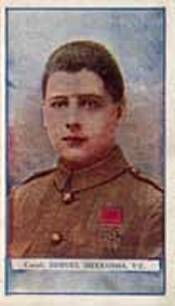Samuel Meekosha facts for kids
Quick facts for kids
Samuel Meekosha
|
|
|---|---|
 |
|
| Born | 16 September 1893 Leeds, West Yorkshire |
| Died | 8 December 1950 (aged 57) Blackwood, Monmouthshire |
| Buried |
Glyntaff Crematorium, Pontypridd
|
| Allegiance | |
| Service/ |
|
| Rank | Major |
| Unit | West Yorkshire Regiment Corps of Military Accountants Royal Army Ordnance Corps |
| Battles/wars | World War I World War II |
| Awards | Victoria Cross |
Samuel Meekosha was a very brave soldier from England. He received the Victoria Cross (VC), which is the highest and most important award for courage in battle. It is given to soldiers from Britain and other Commonwealth countries. Samuel was born on September 16, 1893, and passed away on December 8, 1950. In 1942, he even changed his name to Samuel Ingham because he was so modest about his bravery!
Contents
Samuel's Early Life and Army Start
Samuel Meekosha was born in Leeds, England. When he was just a baby, his family moved to Bradford, and he always thought of Bradford as his home.
Samuel's mother was English, and his father was Polish. He was proud of his family's roots from Eastern Europe. But he was such a humble hero that he later changed his last name to Ingham. This was his mother's maiden name, Cunningham, which he changed by a legal process called a deed poll.
When World War I began, Samuel was 22 years old. He was a corporal in the 1/6th Battalion, West Yorkshire Regiment. This army unit was based at Belle Vue Barracks in Manningham, Bradford.
A Heroic Act in World War I
On November 19, 1915, Corporal Meekosha showed incredible bravery. This happened near the Yperlee Canal, close to a village called Boesinghe (Boezinge) in Belgium.
Samuel was with a small group of about 20 soldiers. They were holding a trench that was all by itself, north of Ypres. Suddenly, there was a very heavy bombing attack. Six soldiers in his group were killed, and seven were wounded. The rest of the soldiers were mostly buried by the explosions.
When there were no senior officers left to lead, Corporal Meekosha took charge. He quickly sent for help. Even though huge shells were still falling very close to him, he kept digging out the wounded and buried men. He did this in plain sight of the enemy, who were very close.
Three other soldiers, Privates Johnson, Sayers, and Wilkinson, helped him. They were all given the Distinguished Conduct Medal (DCM) for their bravery. Because of their courage, at least four lives were saved that day.
Life After the War
Samuel Meekosha continued his army career. He became an officer in the West Yorkshire Regiment in 1917. He was promoted to Lieutenant in 1918 and Captain in 1919. Later, he moved to the Corps of Military Accountants in 1919 and left the army in 1926.
When World War II started, Samuel rejoined the West Yorkshire Regiment as a Captain in 1940. He then moved to the Royal Army Ordnance Corps in Leicestershire that same year. He was later promoted to Major.
Samuel was a very modest person. He didn't like to talk about winning the Victoria Cross. When he rejoined the army for World War II, people kept asking him about his unusual name and if he was the one who won the VC. To stop these questions, he legally changed his name to Ingham in 1941 or 1942.
After the First World War, Samuel worked as a representative for a tobacco company called John Player & Sons. He passed away at his home in Oakdale, Blackwood, Monmouthshire, on December 8, 1950. His family took his ashes and spread them on Ilkley Moor in Yorkshire.
Samuel's Victoria Cross Medal
Samuel Meekosha's Victoria Cross medal was sold at an auction called Sotheby's on May 3, 2001. It was sold for £101,200.
 | Aurelia Browder |
 | Nannie Helen Burroughs |
 | Michelle Alexander |

